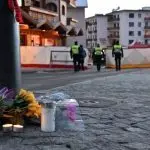(GAZA) — Exactly 12 hours after militants in Gaza fired the last couple of pot shots into Israel before the ceasefire went into effect, we crossed a haphazard Hamas checkpoint into Gaza. It had been thirteen years since my last visit. It was immediately clear that over the years, time and gravity had done far worse to Gaza than Israeli air strikes.
That’s largely because Israel has essentially blockaded Gaza for the past 20 years, since the beginning of the second intifada in late 2000.
Every sack of cement or flour, every bunch of bananas and apples comes from Israel. Gazans can get Egyptian goods but they say their quality is “zift” — or crap.
Driving in past the town of Beit Hanoun you find a few buildings obliterated by Israeli air strikes. On the main road, missiles atomized a building spraying its gray disintegrated concrete over 150 yards.
In downtown Gaza, the pancaked al-Jala building that once housed the Associated Press, al-Jazeera and other international media bureaus defies comprehension. It looks like a professional demolition team took it down — like a layer cake, with slabs of concrete floors and office supplies and desk chairs oozing out. Same with the al-Hanadi tower – it’s 15 stories flopped side-ways. It now looks like a giant ancient accordion. What Israel targeted is completely gone.
During the fighting, Gaza had been a ghost town. But with the guns silenced, Gazans immediately emerged to survey the damage and get out of their homes. Big families of eight or 10 packed into tiny cars, cruising by the flattened buildings and making their way to funeral tents to pay their respects. Those who could afford it also went to restaurants by the thousands and stacked themselves outside shwarma joints late into the night as they did some much needed shopping.
Though sagging and crumbling, with it’s jury-rigged electrical wires draped across streets, and creaking with dusty jalopies, Gaza was not destroyed. The vast majority of buildings were spared. Its people were not.
The size of the city of Philadelphia, Gaza is one of the most densely populated places on earth. The thousands of bombs dropped there rattled buildings and shattered nerves. No one was spared the sound of sonic booms and claps of high explosives, along with the fear that your house could be next.
Our Gaza producer, who filmed an Israeli air strike on a neighbor’s home as the shockwaves blew out his windows, describes feeling as if his home were on rollers during the shelling — swaying back and forth. He relished working during the war. Not because he liked the risk, but because it took him out of his home.
Our producer has unrivaled connections. He leaves his keys in his car at night because no one would dare steal his car, he told me. But he said he couldn’t stand looking into the faces of his children when they asked him when it would end or if they would be hit next. He had no idea if there were tunnels nearby, or whether militants were sheltering in the neighborhood if rockets had been launched from there. For once, the guy who had all the answers, all the connections couldn’t provide an answer. He couldn’t ease their fears.
If you have never been to Gaza, or Israel for that matter, it is hard to comprehend how compact the place is. If you look north from the balcony of the al-Mashtal hotel in Gaza City, two landmarks immediately stand out. The twin minarets of the al-Khaldi mosque, and the twin smokestacks of the Dorad power plant in the Israeli city of Ashkelon, less than seven miles up the beach. Tel Aviv is 40 miles away. If there were no border, with its wall and pillboxes, I could have turned right out of the hotel and followed the soft sand up the beach jogging to Ashkelon in less than an hour. It takes a rocket just a few seconds to get there.
That smallness, that proximity to thriving Israel enhances the sense that Gaza is a prison. The median age of Gaza is 18, the majority of its residents were born after the second Intifada erupted in 2000. It’s arguable that most of them have never left the Strip in their lives.
Gazans have very little. But they have time. And Hamas, especially, takes the long view of history.
On Saturday I had a long talk with a Hamas spokesman. While we talked, his two precocious young sons poked around the rubble of the building where 42 were killed on Wahda street. He was perplexed. He kept calling Israel’s handling of the Palestinian-Israeli riots “idiotic.” He said Israel has been playing into Hamas’ hands. Never have Palestinians been so united.
Its old guard, some of whom used to work in Israel decades ago and can still read Hebrew, are avid consumers of the Israeli press. They also read the foreign coverage of the region in English and Arabic. Their analysis is that Israel is disintegrating more quickly than they had anticipated and they are doing so from the inside.
He noted Israel’s soon-to-be fifth election in two years, along with 20% of the population rising up — referring to the riots that rocked towns inside Israel with mixed Jewish and Palestinian populations. These are ethnic Palestinians with Israeli citizenship. But they are often treated like second class citizens.
He asked why would Israel treat them like that knowing that it could blow up in their faces? Knowing, he said, that they are basically Israel’s fifth column.
He pointed out that he believed Tel Avivians continue to live blissfully in their bubble, that Arabs have lynched Jews and Jews lynched Arabs. Hamas — and many Israelis — feel that the current situation is untenable.
He told me a quip that’s been going around.
Question: What does the two-state solution mean to Israelis?
Answer: When Israel falls apart they’ll take their second passports and move to another country.
And here what was so interesting: Hamas’ long view.
The spokesman said that before Hamas there was the PLO, and before them the Fedayeen who launched countless attacks on Israeli settlements in the 1950s, many of them from Gaza. Hamas won’t be around forever, he added, but some group will eventually replace them — but they hope not ISIS which Hamas has worked to crush in Gaza. And, eventually, even within the next generation, there will indeed be one state between the Jordan River and the Mediterranean. And it won’t be Jewish, said the Hamas spokesman.
On Friday we visited Muhammad Hadidi. He lost his wife and four sons in an air strike last week. He thought his entire family was wiped out, but was later brought to al-Shifa hospital where his son lay, his leg in a cast. The father wept and softly kissed his five-month-old son. Baby Omar clutched his father’s finger.
A few days later, as is customary, Hadidi’s relatives had helped him set up a mourning tent — it had been too dangerous to do so earlier. He offered kisses and hugs to guests coming to sit in the tent along with thin black coffee.
When we sat down with him, he was holding Omar, fussing with a little cap on his head. Muhammad told us that right now, Omar is his whole world. Everything. When I asked him what he hopes for his son, he said “a good, sweet life.” I asked if that’s possible here.
“Not here, not in Gaza,” he responded.
Copyright © 2021, ABC Audio. All rights reserved.







